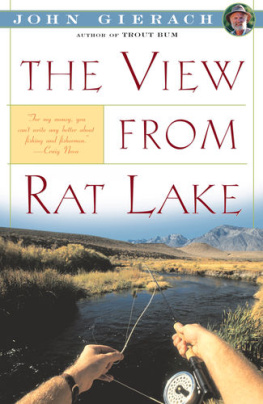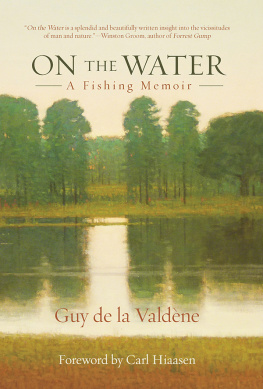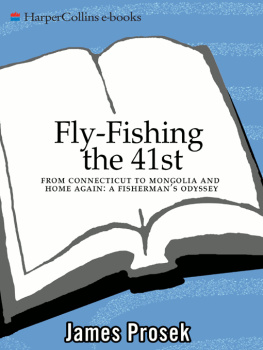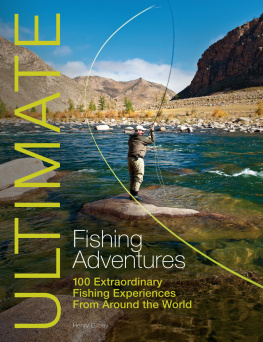Introduction
I think writing is a lot like fishing, especially when its about fishing, as most of mine is. Both take curiosity, patience, persistence, lots of time, some skill, a willingness to put things together in odd ways, an appreciation of the process itself (regardless of how it turns out), and faith that its all somehow worthwhile. What sane person would spend a whole day writing a paragraph that reads like it was dashed off in thirty seconds? The same kind whod fish for one big trout all morning just so he can look at it and release it.
I like to think I was born to be a fisherman. Theres a family story that I caught my first bluegill at age five and wanted to have it mounted. I dont remember that, but it sounds about right. By the time I was a teenager I fit the standard profile of a lifelong angler: I was lazy, shiftless, unambitious, and willing to work hard only at things that were widely considered useless. My folks thought Id grow out of it.
As for writing, I dont remember why I first thought Id like it, but I have to suspect its because writers werent very well thought of and because they didnt seem to work. At a certain age, playing hard, not really working, and living up to a bad reputation seemed like the way to go.
My first revelation was that writing did involve some work. Lots of it, actually. Some people have a warped view of writers in general, and outdoor writers in particular. Now and then someone will say to me, Boy, what a life you have. All you do is fish. Usually I nod and smile because thats what I used to think myself and because its not entirely wrong, but theres a mood I sometimes get into that makes me ask, Who the hell do you think writes the stories?
Then there are those wholl tell you youre blessed with talent, which is another way of saying you dont work. If you explain that whatever talent you may have now is the result of decades of toil, theyll say that kind of patience is a gift. Theres no talking to some people. If they want you to be blessed, then youre blessed, god damn it! Dont argue.
Then again, one of my more levelheaded friends once said, Look, if someone thinks you dont work, maybe it means your writing seems effortless, so you should take it as a compliment. I wouldnt mind having more levelheaded friends, but when eventually almost everyone you know is a fly fisher, guide, writer, editor, or publisher, you take what you can get.
I didnt start out to be a fishing writer; I started out to be a serious writer, back when I was much younger and still liked the sanctimonious sound of that. I wrote my first stories for outdoor magazines out of curiosity; to see if maybe that wouldnt be a better way for a struggling writer to support himself than driving a garbage trucknot that driving a garbage truck was all that bad.
That didnt work out the way I had it pictured because writing for a living turned out to be a full-time job that left less time and energy for art than real work had. On the other hand, I found that writing was writing and that any subjectwith the possible exception of golfcould open up on grand themes if thats what you wanted it to do.
I remember two milestones now: the first story I sold, and the first story I sold that seemed to be about grayling fishing in Canada but that was really about death. At the time I thought Id fooled the editor who bought it, but years later I ended up fishing for salmon in Scotland with him and he said, Remember that story you did once about death and grayling? I liked that one.
Some of these stories began in the Outside column Ive been writing for the Longmont Daily Times-Call newspaper for the last seventeen years and also the one I did for the New York Times for a short period in the early 90s. Being a weekly columnist is grueling, but its a good job for a writer. If nothing else, its steady work, and it also keeps you in shape, like hiking two or three miles a day unless theres a good reason not to, which I also do. You know that whatever else happens in a weeks time, youll write one reasonably coherent, 800-word story, and in most cases youll go fishing at least one extra time so youll have something to write about.
It really is grueling at timesthe writing, not the fishingbut by now Im so used to it Id probably miss it. I didnt even realize how long Id been doing it until a few years ago, when, during my rare appearances in the newsroom, some of the younger people there started calling me sir and a man in his thirties told me hed grown up reading my column.
Anyway, some of those short columns hinted at something more, so they went on to become magazine stories, and then finally book chapters, usually getting longer and more genuine in the process. A book is the only place where I dont run into constraints on length, language, or content, and in a few cases book chapters have served as revenge against editors who located the heart and soul of a story and removed it before it appeared in the magazine or who just chopped it for length and accidentally hit a vital spot.
I hadnt read most of these essays since they were published, because by the time a book comes out Im done with it. For one thing, Ive moved on to other fishing trips and other stories. And Ive already read the thing dozens of times, carefully, critically, changing this and that, then maybe changing it back to the way it was to begin with. Then I read the copyedited manuscript. Then I proofed the galleys. When the actual book arrives in the mail, Im happy to see iteven get a little glow of satisfactionbut I dont feel like reading it again.
Then I have to pick a nice short chapter to read aloud on the brief publicity tour my publisher now sends me on when I have a new book. (I read the same one over and over so I come to know it by heart and dont stammer too much.) Im fairly new to book tours and I guess theyre not my favorite part of being a writer. Theres something in my Midwestern Protestant upbringing that makes me shy about being the center of attention, and of course book tours are almost always scheduled when the fish are biting back home.







